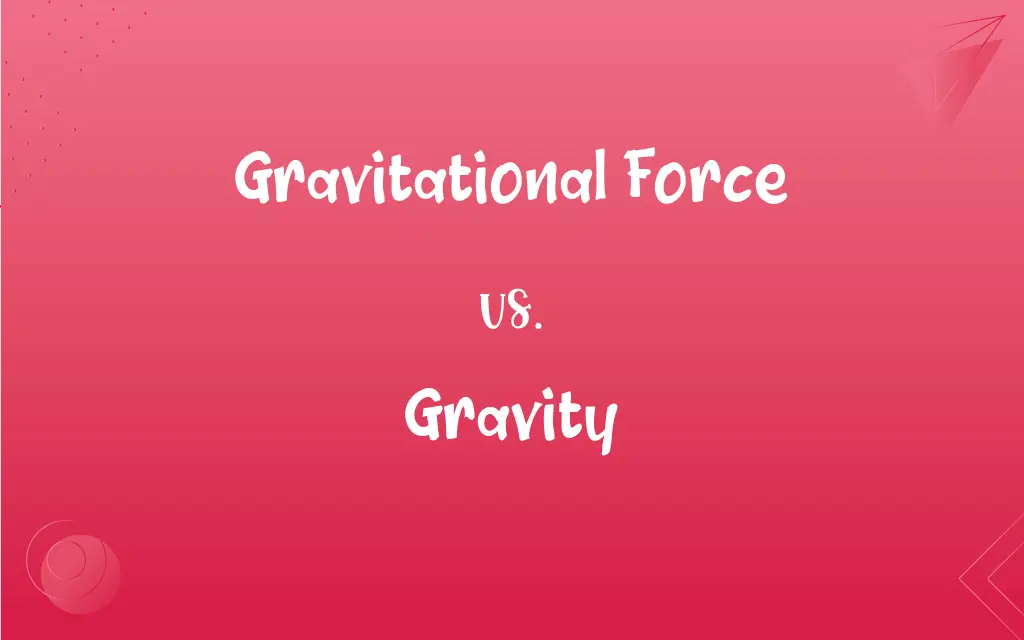Gravitational Force vs. Gravity: What's the Difference?
Edited by Aimie Carlson || By Harlon Moss || Published on December 9, 2023
Gravitational force is the attractive force between two masses, while gravity specifically refers to the gravitational force exerted by large bodies like Earth.

Key Differences
Gravitational force is a universal force of attraction between any two masses, fundamental to the laws of physics. On the other hand, gravity is a specific instance of gravitational force, referring to the attraction exerted by celestial bodies like planets and stars.
The gravitational force is described by Newton's law of universal gravitation, applying to all matter. While, gravity, in common usage, often refers to the specific gravitational force that Earth exerts on objects on or near its surface.
Gravitational force is key in explaining astronomical phenomena and the structure of the universe. Gravity is central to understanding terrestrial phenomena, such as why objects fall to the ground.
The strength of gravitational force depends on the masses of objects and their distance apart. However, gravity, as experienced on Earth, is essentially a constant force that gives weight to physical objects.
Gravitational force calculations are crucial in space travel and celestial mechanics. Gravity is a fundamental factor in various Earth-bound processes, from ocean tides to atmospheric behavior.
ADVERTISEMENT
Comparison Chart
Definition
Universal force of attraction between any two masses
The gravitational force exerted by large bodies like Earth
Application
Applies to all matter in the universe
Specifically refers to the force experienced on Earth
Scientific Context
Explains cosmic and celestial phenomena
Explains terrestrial phenomena and weight
Dependency
Depends on mass and distance
Considered a constant near Earth's surface
Relevance
Crucial in astrophysics and celestial mechanics
Central to everyday life experiences on Earth
ADVERTISEMENT
Gravitational Force and Gravity Definitions
Gravitational Force
It is a fundamental force that acts at a distance.
Gravitational force is responsible for the tides caused by the moon.
Gravity
It gives weight to physical objects on Earth.
The weight of an object is determined by the force of gravity on it.
Gravitational Force
Gravitational force is the attraction between any two objects with mass.
The gravitational force keeps planets in orbit around the sun.
Gravity
Gravity is a constant near the Earth's surface.
Objects accelerate at 9.8 m/s² due to Earth's gravity.
Gravitational Force
Gravitational force is essential in astrophysics and cosmology.
Gravitational force helps us understand the movement of celestial bodies.
Gravity
Gravity influences Earth’s tides, atmosphere, and life.
Gravity plays a crucial role in forming and maintaining Earth's atmosphere.
Gravitational Force
Gravitational force increases with mass and decreases with distance.
Distant galaxies exert less gravitational force on each other.
Gravity
Gravity is the force that attracts objects toward the center of the Earth.
Gravity is what makes things fall to the ground when dropped.
Gravitational Force
It is described by Newton's law of universal gravitation.
Newton's law calculates the gravitational force between two bodies.
Gravity
Gravity is essential in everyday life experiences on Earth.
Gravity keeps our feet firmly on the ground.
Gravity
The natural attraction between physical bodies, especially when one of the bodies is a celestial body, such as the earth.
Gravity
See gravitation.
FAQs
Does gravity only act on Earth?
No, gravity acts on all celestial bodies, but its effects are most noticeable on planets.
How does gravitational force affect planets?
It keeps planets in orbit around stars.
Can gravitational force exist in a vacuum?
Yes, it acts across empty space.
How does gravity influence tides?
Earth's gravity interacts with the moon's, affecting ocean tides.
What is gravitational force?
It's the force of attraction between any two objects with mass.
Does gravitational force get stronger with distance?
No, it weakens with increasing distance.
Is gravitational force important for spacecraft?
Yes, it's crucial for navigating and maintaining orbits.
Can gravity be felt in space?
Yes, but it's weaker, leading to microgravity conditions.
How is gravity defined?
Gravity is the force that attracts objects toward a celestial body like Earth.
What law describes gravitational force?
Newton's law of universal gravitation.
Is gravitational force the same as gravity?
Gravitational force is a broader concept, while gravity specifically refers to Earth or similar bodies' attraction.
Is gravity the same everywhere on Earth?
Gravity is nearly constant across Earth's surface, but slight variations exist.
How do black holes relate to gravitational force?
They have extremely strong gravitational forces due to their massive density.
Does gravity affect light?
Yes, strong gravity can bend light, a phenomenon known as gravitational lensing.
What factors affect gravity on Earth?
Earth's rotation and the distribution of its mass.
How do astronauts train for low gravity?
They train in simulated microgravity environments, like underwater or in aircraft performing parabolic flights.
Does gravity affect time?
Yes, stronger gravitational fields can slow down time slightly.
Can humans create gravitational forces?
Humans cannot create them, but they can study and measure the effects.
Why don't we feel gravitational forces from all objects?
The force is too weak to feel unless at least one of the objects is very massive, like a planet.
Are gravitational force and magnetism related?
They are different forces; gravity is due to mass, while magnetism is due to electric charges in motion.
About Author
Written by
Harlon MossHarlon is a seasoned quality moderator and accomplished content writer for Difference Wiki. An alumnus of the prestigious University of California, he earned his degree in Computer Science. Leveraging his academic background, Harlon brings a meticulous and informed perspective to his work, ensuring content accuracy and excellence.
Edited by
Aimie CarlsonAimie Carlson, holding a master's degree in English literature, is a fervent English language enthusiast. She lends her writing talents to Difference Wiki, a prominent website that specializes in comparisons, offering readers insightful analyses that both captivate and inform.







































































